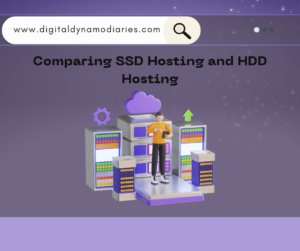Optimizing Web Hosting for a Job Listing Websites
In today’s competitive job market, job listing websites serve as essential platforms that bridge the gap between job seekers and employers. These websites must handle substantial data, deliver swift performance, and ensure robust security. Selecting the right web hosting solution is crucial for achieving these goals. This comprehensive guide will walk you through everything you need to know about optimizing web hosting for a job listing website.
Understanding the Requirements of a Job Listing Websites
Before diving into the specifics of web hosting, it’s vital to grasp the unique requirements of a job listing website:
1. High Traffic Volume: Job listing websites often experience heavy traffic, particularly during peak job-hunting seasons. A hosting solution must manage sudden traffic spikes without compromising performance.
2. Database Management: These sites store vast amounts of data, including user profiles, resumes, job listings, and applications. Efficient database management is crucial for maintaining quick and reliable access to this information.
3. Security: Protecting sensitive user information, such as personal details and employment history, is critical. A hosting solution must provide robust security features to safeguard data from breaches and cyber-attacks.
4. Uptime Reliability: Job seekers and employers expect the website to be accessible at all times. Downtime can lead to missed opportunities and diminished user trust.
5. Scalability: As the website grows, the hosting solution must be capable of scaling resources up or down to accommodate fluctuating traffic and data demands.
Types of Web Hosting for Job Listing Websites
Various web hosting options cater to different needs. Here’s an overview of the most suitable types for job listing websites:
1. Shared Hosting: This is a cost-effective solution where multiple websites share a single server. While it’s suitable for small or new job listing websites with low traffic, it offers limited resources and can lead to slower performance during traffic surges.
2. VPS Hosting: Virtual Private Server (VPS) hosting provides more resources and greater control than shared hosting. It’s an ideal option for growing websites that need better performance and customization capabilities.
3. Dedicated Hosting: With dedicated hosting, an entire server is allocated exclusively to your website. This option offers maximum resources, control, and performance, making it suitable for large job listing websites with high traffic volumes.
4. Cloud Hosting: Cloud hosting utilizes a network of virtual servers to host websites. It offers high scalability, reliability, and flexibility, allowing easy adjustment of resources based on traffic demands.
5. Managed WordPress Hosting: If your job listing website is built on WordPress, managed hosting provides optimized performance, security, and automatic updates, ensuring your site runs smoothly and securely.
Key Features to Look for in a Web Hosting Provider
Choosing the right web hosting provider is crucial for the success of your job listing website. Consider the following features when making your decision:
1. Performance and Speed: Opt for a provider that guarantees fast load times and consistent performance. Slow websites can lead to user frustration and high bounce rates.
2. Security Features: Ensure the hosting plan includes comprehensive security measures, such as SSL certificates, firewalls, malware scanning, and DDoS protection, to safeguard your site and its data.
3. Scalability Options: Choose a hosting plan that allows easy scalability to accommodate traffic fluctuations. This ensures your website can handle peak traffic without performance issues.
4. Customer Support: Reliable customer support is essential for resolving hosting-related issues promptly. Look for providers that offer 24/7 support via multiple channels.
5. Backup and Recovery: Regular backups and a solid recovery plan are critical to protect your data from accidental loss or cyber-attacks. Ensure your hosting provider offers automated backups and easy restoration options.
Optimizing Your Job Listing Website for Performance
After selecting the right hosting plan, optimize your website to ensure optimal performance and user experience:
1. Content Delivery Network (CDN): A CDN distributes your website’s content across multiple servers worldwide, reducing latency and ensuring fast load times for users regardless of their location.
2. Caching: Implement caching mechanisms, such as browser caching and server-side caching, to store frequently accessed data temporarily. This reduces server load and speeds up page load times.
3. Image Optimization: Compress and optimize images to reduce their file size without compromising quality. This improves load times and reduces bandwidth usage.
4. Minimize HTTP Requests: Reduce the number of elements on your pages, such as scripts, stylesheets, and images, to decrease load times. Combining files and using CSS sprites can help achieve this.
5. Regular Updates: Keep your website’s software, plugins, and themes up to date to ensure optimal performance, compatibility, and security. Outdated software can lead to vulnerabilities and performance issues.
Security Strategies for Job Listing Websites
Security is a top priority for job listing websites, given the sensitive information they handle. Implement these best practices to protect your site and its users:
1. SSL Certificates: Ensure your site uses SSL certificates to encrypt data transmitted between the server and users. This protects sensitive information from being intercepted by malicious actors.
2. Regular Security Audits: Conduct regular security audits to identify and address vulnerabilities. This proactive approach helps maintain a secure environment for your users.
3. Two-Factor Authentication (2FA): Implement 2FA for user accounts to add an extra layer of security. This requires users to provide two forms of verification before accessing their accounts.
4. Data Encryption: Encrypt sensitive data stored on your servers to protect it from unauthorized access. This includes user passwords, personal information, and any other confidential data.
5. User Access Control: Limit access to critical areas of your website to authorized personnel only. Use role-based access control (RBAC) to assign appropriate permissions to different users.
Conclusion
Optimizing web hosting for a job listing website involves understanding the site’s specific requirements, selecting the right hosting plan, and implementing performance and security best practices. By choosing a hosting provider that offers reliable performance, robust security, and scalability, you can ensure your job listing website runs smoothly and efficiently. This will provide a seamless experience for both job seekers and employers, ultimately contributing to the success of your platform.



